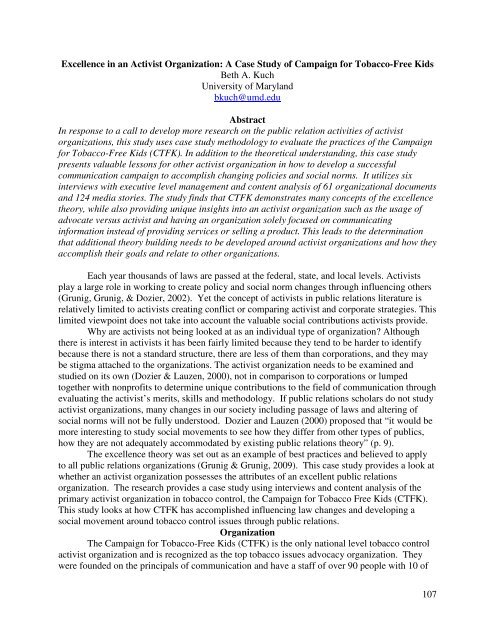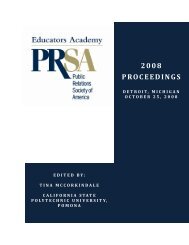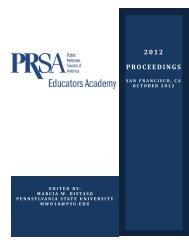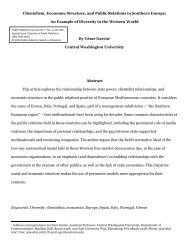2010 - Public Relations Society of America
2010 - Public Relations Society of America
2010 - Public Relations Society of America
Create successful ePaper yourself
Turn your PDF publications into a flip-book with our unique Google optimized e-Paper software.
Excellence in an Activist Organization: A Case Study <strong>of</strong> Campaign for Tobacco-Free Kids<br />
Beth A. Kuch<br />
University <strong>of</strong> Maryland<br />
bkuch@umd.edu<br />
Abstract<br />
In response to a call to develop more research on the public relation activities <strong>of</strong> activist<br />
organizations, this study uses case study methodology to evaluate the practices <strong>of</strong> the Campaign<br />
for Tobacco-Free Kids (CTFK). In addition to the theoretical understanding, this case study<br />
presents valuable lessons for other activist organization in how to develop a successful<br />
communication campaign to accomplish changing policies and social norms. It utilizes six<br />
interviews with executive level management and content analysis <strong>of</strong> 61 organizational documents<br />
and 124 media stories. The study finds that CTFK demonstrates many concepts <strong>of</strong> the excellence<br />
theory, while also providing unique insights into an activist organization such as the usage <strong>of</strong><br />
advocate versus activist and having an organization solely focused on communicating<br />
information instead <strong>of</strong> providing services or selling a product. This leads to the determination<br />
that additional theory building needs to be developed around activist organizations and how they<br />
accomplish their goals and relate to other organizations.<br />
Each year thousands <strong>of</strong> laws are passed at the federal, state, and local levels. Activists<br />
play a large role in working to create policy and social norm changes through influencing others<br />
(Grunig, Grunig, & Dozier, 2002). Yet the concept <strong>of</strong> activists in public relations literature is<br />
relatively limited to activists creating conflict or comparing activist and corporate strategies. This<br />
limited viewpoint does not take into account the valuable social contributions activists provide.<br />
Why are activists not being looked at as an individual type <strong>of</strong> organization? Although<br />
there is interest in activists it has been fairly limited because they tend to be harder to identify<br />
because there is not a standard structure, there are less <strong>of</strong> them than corporations, and they may<br />
be stigma attached to the organizations. The activist organization needs to be examined and<br />
studied on its own (Dozier & Lauzen, 2000), not in comparison to corporations or lumped<br />
together with nonpr<strong>of</strong>its to determine unique contributions to the field <strong>of</strong> communication through<br />
evaluating the activist’s merits, skills and methodology. If public relations scholars do not study<br />
activist organizations, many changes in our society including passage <strong>of</strong> laws and altering <strong>of</strong><br />
social norms will not be fully understood. Dozier and Lauzen (2000) proposed that “it would be<br />
more interesting to study social movements to see how they differ from other types <strong>of</strong> publics,<br />
how they are not adequately accommodated by existing public relations theory” (p. 9).<br />
The excellence theory was set out as an example <strong>of</strong> best practices and believed to apply<br />
to all public relations organizations (Grunig & Grunig, 2009). This case study provides a look at<br />
whether an activist organization possesses the attributes <strong>of</strong> an excellent public relations<br />
organization. The research provides a case study using interviews and content analysis <strong>of</strong> the<br />
primary activist organization in tobacco control, the Campaign for Tobacco Free Kids (CTFK).<br />
This study looks at how CTFK has accomplished influencing law changes and developing a<br />
social movement around tobacco control issues through public relations.<br />
Organization<br />
The Campaign for Tobacco-Free Kids (CTFK) is the only national level tobacco control<br />
activist organization and is recognized as the top tobacco issues advocacy organization. They<br />
were founded on the principals <strong>of</strong> communication and have a staff <strong>of</strong> over 90 people with 10 <strong>of</strong><br />
107
















